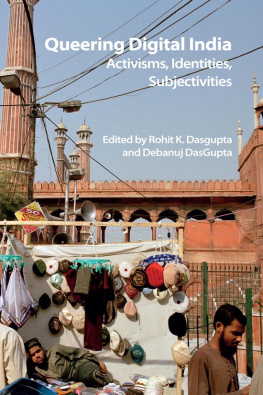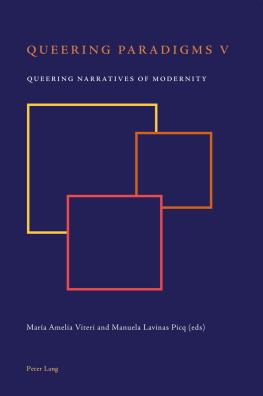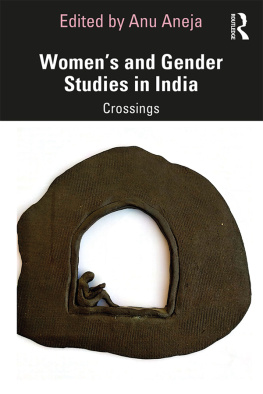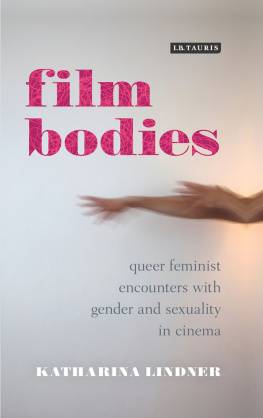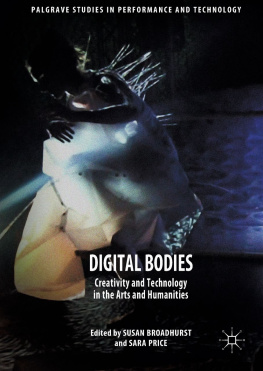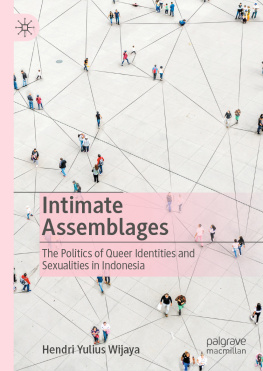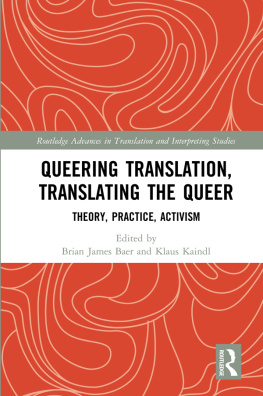
Queering Digital India
Technicities
Series Editors: John Armitage, Ryan Bishop and Joanne Roberts, Winchester School of Art, University of Southampton
The philosophy of technicities: exploring how technology mediates art, frames design and augments the mediated collective perception of everyday life.
Technicities will publish the latest philosophical thinking about our increasingly immaterial technocultural conditions, with a unique focus on the context of art, design and media.
Editorial Advisory Board
Benjamin Bratton, Cheryl Buckley, Sean Cubitt, Clive Dilnot, Jin Huimin, Arthur Kroker, Geert Lovink, Scott McQuire, Gunalan Nadarajan, Elin OHara Slavick, Li Shqiao, Geoffrey Winthrop-Young
Published
Lyotard and the Inhuman Condition: Reflections on Nihilism, Information and Art
Ashley Woodward
Critical Luxury Studies: Art, Design, Media
Edited by John Armitage and Joanne Roberts
Cold War Legacies: Systems, Theory, Aesthetics
Edited by John Beck and Ryan Bishop
Fashion and Materialism
Ulrich Lehmann
Queering Digital India: Activisms, Identities, Subjectivities
Edited by Rohit K. Dasgupta and Debanuj DasGupta
Forthcoming
Zero Degree Seeing: Barthes/Burgin and Political Aesthetics
Edited by Ryan Bishop and Sunil Manghani
www.edinburghuniversitypress.com/series/tech
Queering Digital India
Activisms, Identities, Subjectivities
Edited by Rohit K. Dasgupta and Debanuj DasGupta
EDINBURGH
University Press
Edinburgh University Press is one of the leading university presses in the UK. We publish academic books and journals in our selected subject areas across the humanities and social sciences, combining cutting-edge scholarship with high editorial and production values to produce academic works of lasting importance. For more information visit our website: edinburghuniversitypress.com
editorial matter and organisation Rohit K. Dasgupta and Debanuj DasGupta, 2018
the chapters their several authors, 2018
Edinburgh University Press Ltd
The Tun Holyrood Road
12 (2f) Jacksons Entry
Edinburgh EH8 8PJ
Typeset in 11/13 Adobe Sabon by
IDSUK (DataConnection) Ltd, and
printed and bound in Great Britain.
A CIP record for this book is available from the British Library
ISBN 978 1 4744 2117 1 (hardback)
ISBN 978 1 4744 2118 8 (webready PDF)
ISBN 978 1 4744 2119 5 (epub)
The right of Rohit K. Dasgupta and Debanuj DasGupta to be identified as the editors of this work has been asserted in accordance with the Copyright, Designs and Patents Act 1988, and the Copyright and Related Rights Regulations 2003 (SI No. 2498).
Contents
List of Figures
India Shining
Zuckerberg and Modi change their Facebook profile pictures to support the Digital India campaign
Poster from Aligarh (authors collection)
Graphic flier sent by Heatwave
Grindr party poster
Vikram Seth on the cover of India Today, 20 December 2013
PlanetRomeo India discussion forum
Subeshs meme
Mejbuls meme
Former British princely state of Kashmir, disputed region of Kashmir
Series Editors Preface
Technological transformation has profound and frequently unforeseen influences on art, design and media. At times technology emancipates art and enriches the quality of design. Occasionally it causes acute individual and collective problems of mediated perception. Time after time technological change accomplishes both simultaneously. This new book series explores and reflects philosophically on what new and emerging technicities do to our everyday lives and increasingly immaterial technocultural conditions. Moving beyond traditional conceptions of the philosophy of technology and of techne, the series presents new philosophical thinking on how technology constantly alters the essential conditions of beauty, invention and communication. From novel understandings of the world of technicity to new interpretations of aesthetic value, graphics and information, Technicities focuses on the relationships between critical theory and representation, the arts, broadcasting, print, technological genealogies/histories, material culture and digital technologies and our philosophical views of the world of art, design and media.
The series foregrounds contemporary work in art, design and media while remaining inclusive, both in terms of philosophical perspectives on technology and interdisciplinary contributions. For a philosophy of technicities is crucial to extant debates over the artistic, inventive and informational aspects of technology. The books in the Technicities series concentrate on present-day and evolving technological advances but visual, design-led and mass-mediated questions are emphasised to further our knowledge of their often-combined means of digital transformation.
The editors of Technicities welcome proposals for monographs and well-considered edited collections that establish new paths of investigation.
John Armitage, Ryan Bishop and Joanne Roberts
Acknowledgements
The editors are grateful to many people for making this volume happen. We would like to first thank the series editors, Professor Joanne Roberts, Professor John Armitage and Professor Ryan Bishop, for commissioning this volume. We are grateful to the three anonymous peer reviewers whose comments and feedback have made this a much stronger volume. Some of the conversations and discussion which led to the creation of this volume started at the 3rd European Geographies of Sexualities Conference in Rome where we suggested a panel on Queering Digital India. Thanks to the organisers (especially Cesare di Feliciantonio), participants and audience (especially Dr Gavin Brown and Dr Shaka McGlotten) for their thought provoking response and feedback.
We are grateful to several friends who have influenced, read sections of the draft and encouraged us to work on this volume and in this area (in no particular order): Tim Aldcroft, Radhika Gajjala, Paul Boyce, Aniruddha Dutta, Sharif Mowlabocus, Ruth Vanita, Niharika Banerjea, Rahul Rao, Jussi Parikka, Ed DSouza, K. Moti Gokulsing, Kaustav Bakshi, Christopher Pullen, Sayantan Dasgupta, Sunil Gupta, Sara Davidmann, William Raban, Toby Miller, Sunil Gupta, Pawan Dhall, Anindya Hajra, Minakshi Sanyal, Subhagata Ghosh, Raina Roy, Deep Purkayastha, Basudeb Roy, Mejbul Haque, Subesh Poddar, Caroline Osella, Silvia Posocco, Bill Grantham, Graham Murdock, Anamaria Tamayo-Duque, Jo Tacchi, Seth Giddings, Daniel Ashton, Mary Thomas, Shannon Winnubst, Lynn Itagaki, Jennifer Suchland, Hugh Urban, Ken Foote, Manisha Desai, Kaciano Gadelha, Robert Kulpa, Ece Algan, Burce Celik, Shinjoung Yeo, Shamira Meghani, Kathe Browne, Leela Bakshi, Ila Nagar, Jaime Grant, Lipi Begum, Reina Lewis, Rittika Dasgupta, Jack Harrison Quintana, Bishnupriya Ghosh and Sri-Devi Thakillapati. We also remember the inimitable Agniva in our fond memories, who passed away while this book was in production. Sunil Gupta deserves a special mention for his photograph which has become our cover image. The image captures the changing tensions between the analogue past and the digital future of India. Sunil needs no introduction as a globally recognised South Asian queer artist but he is also a friend, ally and teacher.
The authors would also like to thank Cathy Sclund-Vials, Director of the Asian & Asian American Studies Institute at the University of Connecticut for generously providing us with a faculty research grant in order to support the indexing costs during the final production of this book. Rohit would also like to thank the Wellcome Trust (Grant number: 201329/Z/16/Z) for providing funding to carry out some of the research in this book.
Next page
